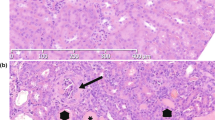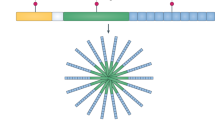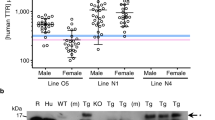Abstract
WIDESPREAD tissue deposition of the unique fibrous protein amyloid occurs in a variety of human diseases1. ‘Secondary’ amyloidosis arises as a complication of chronic infectious or inflammatory disease and an identical syndrome can be induced in mice by repeated injections of casein2. Little genetic work has been done in this area, probably because development of amyloidosis is often variable, even with a standard induction regimen, and results are inconsistent3. Furthermore, because of the many complex immunological aberrations occurring during the amyloid induction period4, the various experimental manipulaions which can affect it4, and the wide range of induction times seen in different murine strains2, on would expect that multiple genes and alleles would influence amyloidogenesis. Nevertheless, the discovery of the uniquely resistant A strain5 suggested the posiblity of isolating at least part of the genetic analysis of amyloid induction in two inbred strains, CBA/J and A/J, differing markedly in susceptibility to amyloidosis5. We show for the first time that a single gene confers resistance on the A/J strain. Our results imply that genetic factors may also define subpopulations of chronic disease patients who are at greater risk from amyloid disease.
This is a preview of subscription content, access via your institution
Access options
Subscribe to this journal
Receive 51 print issues and online access
$199.00 per year
only $3.90 per issue
Buy this article
- Purchase on Springer Link
- Instant access to full article PDF
Prices may be subject to local taxes which are calculated during checkout
Similar content being viewed by others
References
Cohen, A. S. & Calkins, E. Nature 183, 1202–1203 (1959).
Cohen, A. S. & Cathcart, E. S. in Methods and Achievements in Experimental Pathology Vol. 6 (eds Bajusz, E. & Jasmin, G.) 207–242 (Karger, Basel, 1972).
Cohen, A. S. & Shirahama, T. Am. J. Path. 68, 441–444 (1972).
Hardt, F. & Ranlov, P. Int. Rev. exp. Path. 16, 273–334 (1976).
Scheinberg, M. A. & Cathcart, E. S. Immunology 27, 953–963 (1974).
Janigan, D. T. & Druet, R. L. Am. J. Path. 48, 1013–1025 (1966).
Page, D. L. & Glenner, G. G. Am. J. Path. 67, 555–570 (1972).
Kisilevsky, R. et al. Lab. Invest. 37, 544–553 (1977).
Britten, S. J. exp. Med. 142, 1564–1569 (1975).
Rosenstreich, D. L., J. Immun. 121, 1664–1670 (1978).
Scheinberg, M. A. & Cathcart, E. S. Immunology 31, 443–453 (1976).
Lavie, G., Zucker-Franklin, D. & Franklin, E. C. J. exp. Med. 148, 1020–1031 (1978).
Author information
Authors and Affiliations
Rights and permissions
About this article
Cite this article
WOHLGETHAN, J., CATHCART, E. Amyloid resistance in A/J mice is determined by a single gene. Nature 278, 453–454 (1979). https://doi.org/10.1038/278453a0
Received:
Accepted:
Issue Date:
DOI: https://doi.org/10.1038/278453a0
This article is cited by
Comments
By submitting a comment you agree to abide by our Terms and Community Guidelines. If you find something abusive or that does not comply with our terms or guidelines please flag it as inappropriate.



